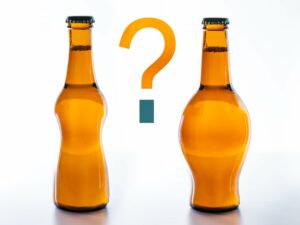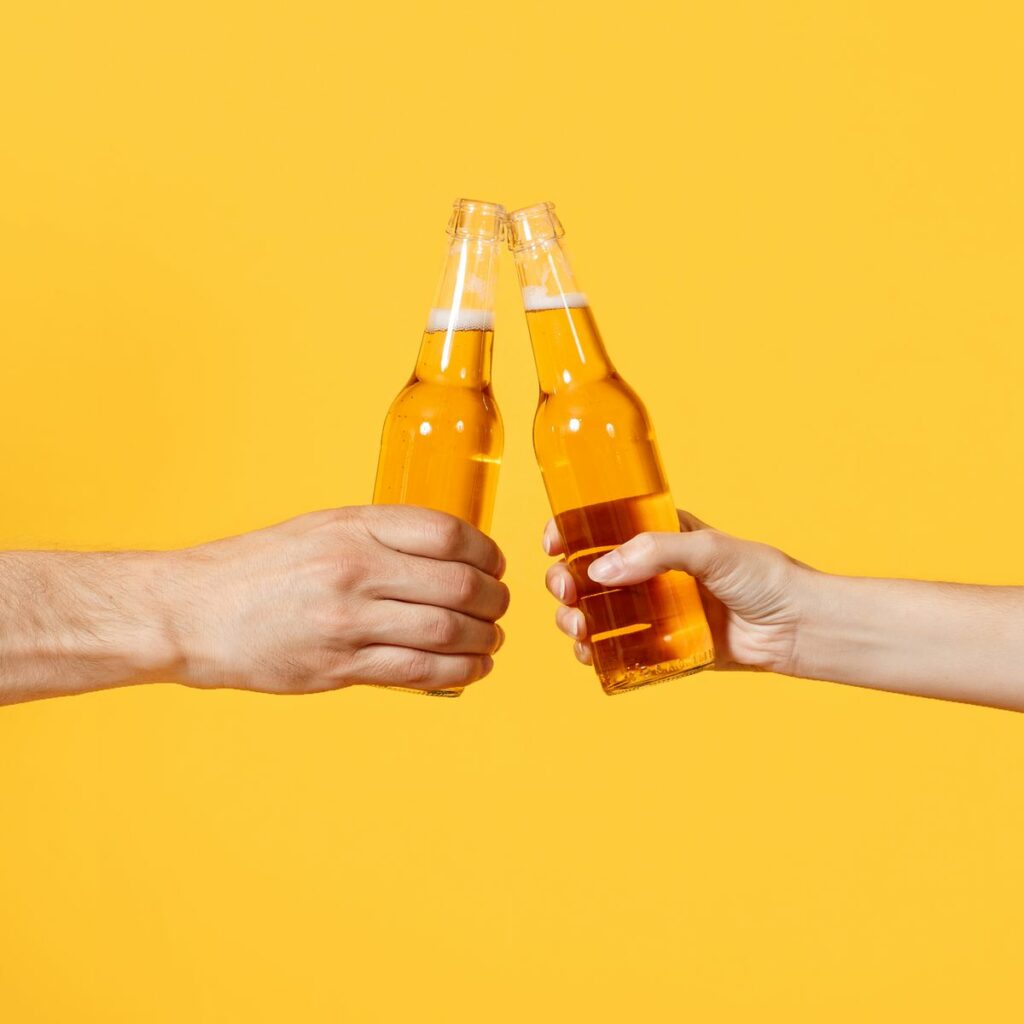There are a lot of myths about weight loss out there. One of the most common ones is that alcohol can help you lose weight. Is this really true? Or is it just another myth that people believe without checking the facts? In this blog post, we will take a look at the science behind alcohol and weight loss, and see if there is any truth to this claim or not.
Contents
Can I Drink Alcohol And Still Lose Weight?
 The short answer is yes – you can drink alcohol and still lose weight. However, it’s important to understand that excessive drinking will make it more difficult to lose weight or even maintain your current weight. Alcohol contains empty calories, which are calories that don’t provide any nutritional value.
The short answer is yes – you can drink alcohol and still lose weight. However, it’s important to understand that excessive drinking will make it more difficult to lose weight or even maintain your current weight. Alcohol contains empty calories, which are calories that don’t provide any nutritional value.
These empty calories can add up quickly and can easily contribute to weight gain. Additionally, drinking too much alcohol can lead to poor food choices and other unhealthy behaviors that may interfere with your weight loss goals.
If you choose to drink alcohol while trying to lose weight, it’s important to remember a few key guidelines. Then you may be able to enjoy an occasional alcoholic beverage and still stick to your weight loss plan.
How Are Alcohol And Weight Loss Connected?
There are several ways in which alcohol and weight loss are connected. Some of these connections are listed below:
High in calories
Many alcoholic beverages are high in calories, which can make it difficult to lose weight. A single gram of alcohol has 7 calories, which is almost twice as many as a gram of carbohydrates or protein. As well, alcoholic drinks are often mixed with sugary mixers that add extra calories.
Reduces fat burning
Alcohol consumption can reduce your body’s ability to burn fat. When alcohol is metabolized, it takes priority over the breakdown of other fuels like carbohydrates and fats. This means that your body will burn the alcohol first before turning to stored fat for energy.
Increases appetite
This might be good news for some people, but when it comes to weight loss, increased appetite can work against you. Studies have shown that drinking alcohol can stimulate hunger and result in overeating. For example, a study found that people who drank alcohol before dinner ate 15% more calories than those who had not.
Decreases motivation
Alcohol consumption has been associated with decreased motivation levels, which could lead to a person being less likely to exercise or engage in other activities that promote weight loss. A study found that people who drank alcohol were less motivated to exercise than those who did not.
Impacts hormones
 One of the common and proven effects of alcohol consumption is its impact on hormones. Alcohol can increase levels of cortisol, which results in an increase in belly fat and a decrease in muscle mass. It can also affect insulin levels, leading to increased hunger and cravings for unhealthy foods.
One of the common and proven effects of alcohol consumption is its impact on hormones. Alcohol can increase levels of cortisol, which results in an increase in belly fat and a decrease in muscle mass. It can also affect insulin levels, leading to increased hunger and cravings for unhealthy foods.
Lack of sleep
When people are drinking alcohol, they often find it difficult to get a good night’s sleep. Lack of sleep can have a major impact on weight loss, as it can affect metabolism and hormones. A study found that people who got fewer than 6 hours of sleep each night were more likely to gain weight over time than those who got 7–9 hours.
So, you can see that there are a number of ways in which alcohol consumption can impact weight loss. While moderate drinking may not have major impacts, overindulgence could be detrimental to both your health and your weight loss journey. If you’re trying to lose weight, it’s best to limit or avoid alcoholic drinks as much as possible.
What Factors Impacts Alcohol And Weight Loss Journey?
When you think about the journey to weight loss, alcohol may not seem like a major factor. However, there are a few key factors that can impact how successful you are in your weight loss efforts when it comes to drinking alcohol. Some of these are:
- Types of alcohol you choose: One of the major factors in weight loss and alcohol is the type of alcoholic beverages you select. Hard liquors, like gin, rum, vodka, and whiskey all contain more calories than beers or lighter wines. To cut back on the number of calories you consume while drinking, choose lower-calorie options. That still allows you to enjoy socializing with friends.
- Your body weight: The amount of alcohol you can consume without gaining weight depends on your body type. If you are heavier, it is best to limit the amount of alcohol consumed to avoid excess calories that could contribute to weight gain.
- Frequency and timing: When consuming alcohol, it is important to keep in mind how frequently you drink and when. Binging on alcoholic beverages can lead to more calories consumed per drink and make it difficult to stick to a healthy diet.
- Your activity level: Another important factor when it comes to alcohol and weight loss is your activity level. Moderate exercise can help burn calories, which offsets the negative effects of consuming alcohol. Making sure to stay active and get in some moderate physical activity throughout the week can help you maintain a healthy weight even when drinking on occasion.
Overall, by understanding how these factors impact your journey to weight loss and alcohol consumption, you can ensure that you reach your goals. Eating healthy, engaging in physical activity, and being mindful of the type of drinks you consume can all help you maintain a healthy weight while still enjoying an occasional drink.
The key is to be aware of how alcohol impacts your health and wellness overall. So that you can make smart choices that support both your weight loss efforts.
What Is The Science Behind Alcohol And Weight Loss?
While it may seem contradictory, studies have shown that moderate drinking can actually be beneficial for weight loss. This is because alcohol contains 7 calories per gram compared to carbohydrates and proteins which contain 4 calories per gram and fat which contain 9 calories per gram.
Therefore, when consumed in moderation, the caloric load of alcohol is relatively low allowing it to fit into any healthy diet. Additionally, alcohol consumption has been associated with an increase in metabolic rate. And can also act as a diuretic which can help flush out excess water weight.
However, the science behind alcohol and weight loss is complex. Consuming too much alcohol can have serious health consequences and should be avoided completely. Furthermore, alcohol does not contain any essential nutrients. And can actually interfere with the absorption of beneficial ones such as Vitamin B12.
Hence, it is important to practice moderation when drinking and ensure that your overall caloric intake remains in check. Then only you can reap the benefits of alcohol and weight loss.
What Are Some Best Alcoholics For Weight Loss?
 Alcohol can have a detrimental impact on weight loss efforts, but there are some alcoholic beverages that can be included in a healthy diet. Some of these are listed below:
Alcohol can have a detrimental impact on weight loss efforts, but there are some alcoholic beverages that can be included in a healthy diet. Some of these are listed below:
Light beer
Light beer is lower in calories than regular beer and can be a good choice for those trying to lose weight. A 12-ounce serving of light beer contains about 100 calories, compared to 150 calories in the same size serving of regular beer.
Red or white wine
Both red and white wine is a good choices for those watching their weight, as they contain about 120 calories per 5-ounce glass. For example, a 5-ounce glass of cabernet sauvignon contains 120 calories, and a 5-ounce glass of chardonnay has 122 calories.
Vodka or Whiskey
Hard liquors, such as vodka and whiskey, also make good choices. A 1.5-ounce shot of 80-proof vodka has 97 calories and a 1.5-ounce shot of 80-proof whiskey has 105 calories. Mixing hard liquors with diet sodas or calorie-free mixers can further reduce the number of calories consumed.
Tequila
Another beverage that can be consumed in moderation is tequila. A 1.5-ounce shot of 80-proof tequila has about 104 calories. And if it’s mixed with a calorie-free mixer like seltzer water, the calories can be further reduced.
Brandy
Finally, brandy has about 98 calories in a 1.5-ounce shot, which makes it another good choice for those watching their weight. Low-calorie mixers can be added to reduce the calorie count even further.
In general, when considering alcoholic beverages for weight loss, it’s important to keep in mind that moderation is key. Otherwise, drinking excessively can lead to weight gain and other health issues. Additionally, it’s important to watch out for added sugars or sweeteners that may be added to some alcoholic drinks. These can add unnecessary calories, making it harder to reach your weight loss goals.
Therefore, if you’re looking to drink alcohol while still trying to lose weight, it’s best to stick with lower-calorie options and practice moderation. Doing this can help you stay on track with your weight loss goals while still enjoying a few drinks.
Conclusion
In a nutshell, alcohol and weight loss are highly interconnected. While modest alcohol consumption can be beneficial for some people. On the other hand, it can also have dangerous consequences on weight loss and overall health. To maximize the benefits of drinking responsibly, always consult a doctor before including or excluding any type of alcohol from your diet plan.
Be sure to stay mindful about how much you’re consuming so as to not go overboard and potentially put yourself in a compromising health position. Seek the advice of professionals to ensure that your weight loss journey is healthy, sustainable, and successful!
If you’re interested in learning more, seek the expertise of FitMantra! Our experienced nutritionists can be easily accessed with just a few clicks. And will offer personalized support to assist you in achieving your fitness goals. Our online nutrition counseling, and weight loss program has been designed to help you shed those unwanted pounds! Don’t forget to download our Fitness App available on Android.
